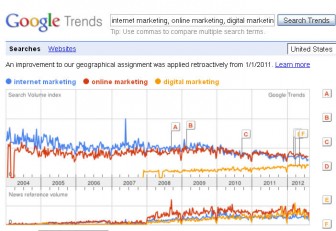Consumers search the web billions and billions of times each month. Here’s how you can use that information to grow your business.
In its latest analysis of U.S. adult user behavior, the Pew Research Center found that search, along with email, is “still top of the list of most popular online activities,” with 92% of all users using search engines to find information and 60% doing so daily. In June 2012, there were 173 billion searches conducted worldwide, not counting those performed on mobile devices, according to ComScore.
With so much searching going on, you can imagine how much information there is to data mine. Take advantage of the relatively inexpensive but powerful insights and actionable information you can glean from keyword search analysis and implement it immediately. While social media may capture headlines, search is still the workhorse.
Here’s exactly how you can tap into keyword data:
1. Find out what interests your current audience.
If you or your company happens to be lucky enough to rank well in a search engine query, you’ll likely drive relevant, qualified traffic to your website. Knowing what keywords drive those visits helps you better understand what potential customers are looking for. And, if those products or services match your business objective, elevate content about them on your website and throughout your digital initiatives.
Here’s to find out. Last October Google announced that it would no longer report keyword referral data on search users signed into Google. In Google Analytics, this appears as “not provided” data. That said, tying Google’s Webmaster Tools into your Google Analytics will allow you to “reclaim” and then analyze much of that lost data.
If you’re not generating traffic from obvious search queries, you probably have a problem with your search visibility that you might want to address. Think about your most important, profitable, or unique products or services. Do they appear in top search results? Make a list of those that are missing; they become targets for paid search or search engine optimization efforts. You may also want to use Google’s AdWords Keyword Tool which allows you to gauge the popularity of a keyword phrase based upon its search volume and which helps reveal related keyword phrases you may not have otherwise thought of.
2. Uncover what your competitors are missing.
Thorough keyword research can also reveal opportunities your competitors are overlooking and therefore could be excellent, wide open markets for you to stake your claim. Remember that your online competitors may be completely different than your “real world” ones, but that doesn’t make them any weaker contenders. Those companies that come up in search results when you’re totally MIA are your competitors…and who you’ll have to do battle with for capturing sales and leads. Use your list of important, profitable, or unique products and services to see which generate results with fewer competitors. You may want to focus your overall marketing and new product development efforts in these areas instead of trying to compete in a saturated marketplace. The Google Keyword Tool also indicates a degree of competition.
3. Stay ahead of trends.
Nothing’s better than staying ahead of the pack by identifying upward relevant keyword trends before your competitors do.
Go to Google Trends and run comparative queries on keywords you know are important to your business now against those your gut tells you might be up-and-coming. Look to see if any are trending up or down to help predict where your new attention should legitimately be focused.

4. Measure the financial return.
Search marketing tactics-even paid search campaigns-are fairly cost-effective. You can use keyword research tools to help you not only estimate the cost of an average visitor, but also if that cost will help you generate effective ROI.
For the richest financial information, create a free Google AdWords account. Once you do, go to the Traffic Estimator to see estimates on both traffic and costs per click to determine how much search inventory you can afford to bid on and what it will cost you to acquire a visitor. Remember, a visitor does not equal a sale or lead.
I also love to use search advertising as a “laboratory” to quickly gauge the reaction of a market to a new product or offer and to conduct speedy ad message testing.
5. Learn from what your competitors are doing.
In paid search, your competitors can bid on your brand name (and vice versa). You can uncover if they’re doing this simply by searching your company name. But you can also use some competitive research tools to reveal what other keywords your competitors bid on and roughly how much they’re paying.
In your Google AdWords account you can use the “Analyze competition” tool or you can get some free sneak peeks from third-party options like SEM Rush or SpyFu, which both charge for deeper information.
6. Don’t rest on your laurels.
Search queries and buyer behavior ebb and flow, so performing routine keyword research on your market will help you make sure you’re staying ahead.
Comments(1)1 Comment »
Leave a comment
Web Ad.vantage is a full-service online marketing company with core competencies in search engine optimization, PPC Campaign Management and online media buying. Visit our Internet Marketing Services section to learn more about our full range of services.
WebAdvantage.net encourages the reprinting of our marketing tips and articles. Before doing so, however, please contact us at for permission to do so. The company bio located above is required to accompany any reprint. Thank you in advance for your professional courtesy.
Pragmatic, professional advice with no hidden agenda.

Internet Business Forum






 back to top
back to top







This strategy is new for me..thanks
Comment by Virda Milano — October 5, 2012 @ 10:30 am